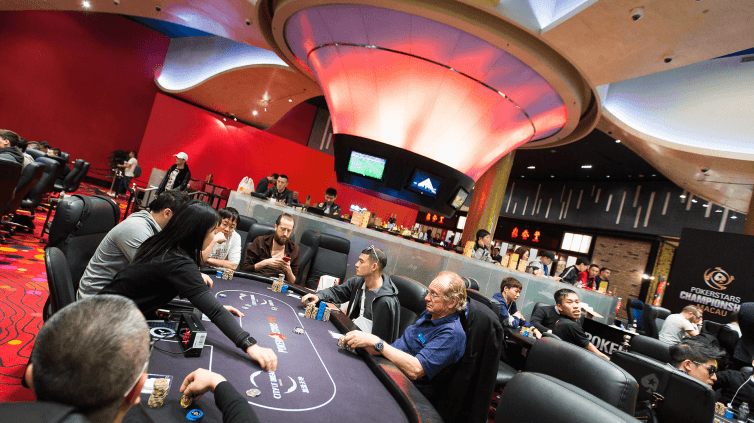Cash vs. Tournament Play
As in all poker, decision-making in cash games is always situation dependent. There is never a precise and definitive answer to questions such as “How should I play a pair of threes?” or “Can I call a raise with top pair?” It will always depend on a number of factors.
Therefore there will be no attempt to give definitive answers in these articles to all the questions typically raised during a cash game. Instead the course shows various examples of situations in Texas Hold’em and offers reasoning and analysis as to what will is the best play.

If you apply the key concepts outlined in the Poker Basics course, then practice often at the tables, you will come to recognise similar situations in your own cash games, where the same kind of reasoning and analysis will apply.
Cash game distinctions
This course will build on what has been learned previously and apply it specifically to a cash game environment. There are numerous ways in which cash games are distinguished from tournaments, including:
- Availability
- Re-buying
- The impact of variance
We will look at each in turn.
Cash game availability
At any time during a cash game, you are permitted simply to leave the table and take with you all the money you have at that point. This differs from a tournament, where you are obliged to play it until you have either won the entire game or been knocked out. This allows cash game players a much greater freedom of game selection.
Also if you are playing cash, you don’t have to wait for a specific time for games to start (as in a multi-table tournament) or for a certain number of players to register (as in a sit and go). You can just scan the lobby for a game you like and sit down immediately if there is a seat open.
If the table is full, you can register your interest on the waiting list and join the action as soon as a seat becomes free. You post your blinds and away you go.
Re-buying
Losing all your chips in a tournament is a disaster. You are out of the tournament and must leave the table. However, this is simply not true in a cash game, where you always have the chance to re-buy and continue playing (bankroll permitting).
That doesn’t mean you should start splashing your chips around without any thought, but it certainly is a comforting fact if you lose to a bad beat or fall on the unlucky side of a marginal play.
It is important to remember in a cash game that “correct play” means there are times you really need to risk all your chips even if you are not certain to win the hand. For instance, you might be playing against a very aggressive maniac player and hold a hand like pocket queens. If he puts you all in pre-flop you are very likely to be a favorite to win, even though it is the nature of poker that you won’t win every single time.
If he has a hand like A♣ 3♦ , he will win 30 per cent of the time. But you should be happy to get your money in regardless of the result. You can just re-buy and get your chips (and more) back later.
In cash games, you need to be thinking about a concept called “expected value“, which focuses on making correct decisions that will be profitable in the long-run. You don’t need to worry so much about a single incidence: If you get your money in with queens against a rag ace time and time again, you will win much more than you lose.
Here’s another example. Let’s say you hold K♥ Q♥ on a board of J♥ 10♥ 5♠ 2♣ . That means you have a flush draw and a straight draw.
On the turn the pot size is approximately 100 big blinds, and your opponent moves all in for his last 20 BB. You are now pretty sure that he holds a set, so you will need to hit one of your draws to win.
With 13 outs you have a winning chance of only about 25 per cent, but you need to risk relatively little to win a big pot. (You need to pay 20 BB to win 140 BB.) In a cash game, you should always call in this situation, regardless of the size of your stack. Even if you only have 20 BBs yourself, it is still the right decision. You can re-buy if you lose.
Bear in mind, you will lose this hand and need to re-buy on three out of four occasions. But it is always the correct play to call. In a tournament it would very much depend on the specific stage, stack sizes, blind levels and closeness to the bubble as to whether you call. In a cash game, these things simply don’t factor.
Less variance
The big money in tournaments is invariably made at the final table, and in big fields it is very tough to make it that far. You need to win a lot of coin-flips and avoid cooler situations and bad beats, all of which are out of your hands. Even if you are a great tournament player, there will be many times where you won’t make any profit on your investment and bad runs can last a surprisingly long time.
“Variance”, as this is known, also exists in cash games, but its implications tend to be much less extreme and more manageable. Although even the best cash game players will lose a couple of sessions in a row, it is possible to cut losses when things aren’t going well, or to drop down levels and play a smaller game.
The winning or losing curves of a cash game player tend to be much less steep and offer a better indication if your playing style is profitable or not.
Others
Other cash-game specific strategy advice comprises the remainder of this course. For instance, starting hand requirements can change slightly depending on the circumstances of a cash game, and relative stack sizes also become much more significant. We consider those factors in the section about pre-flop play.

